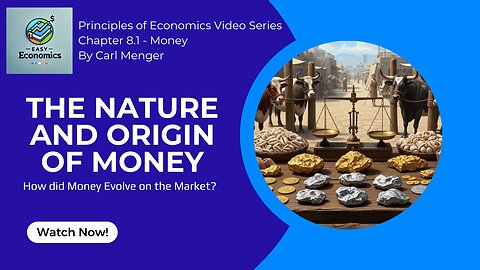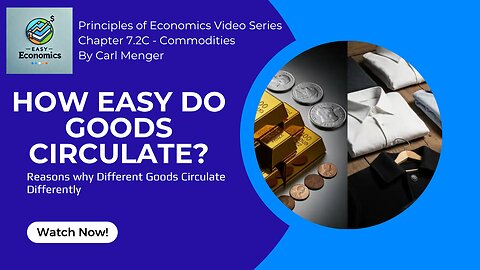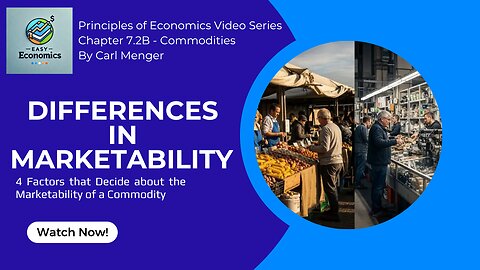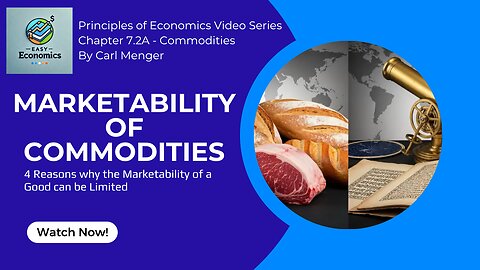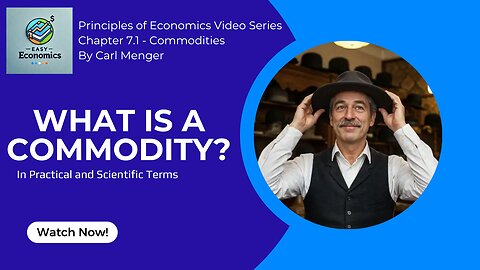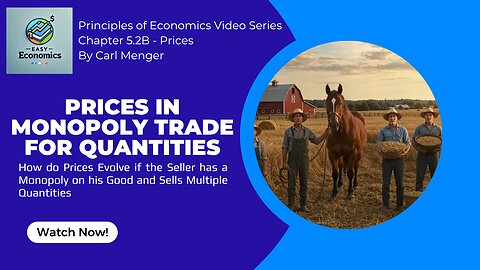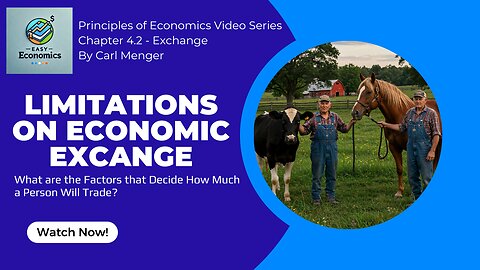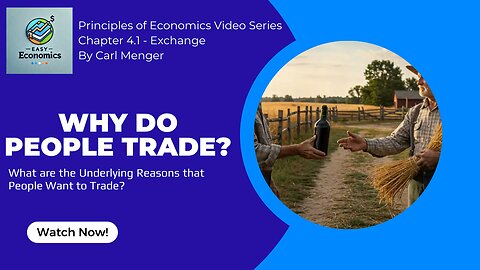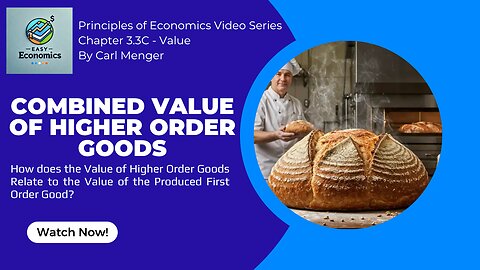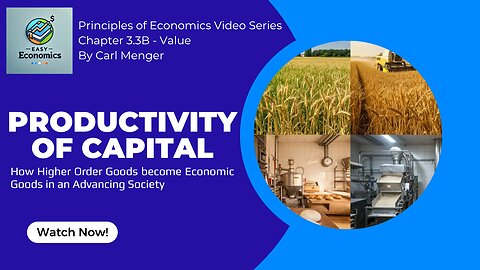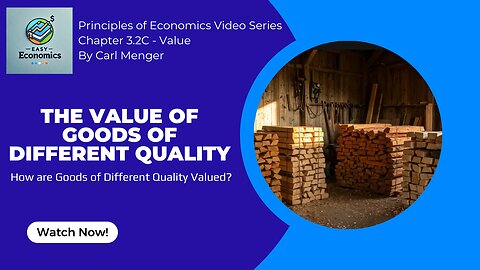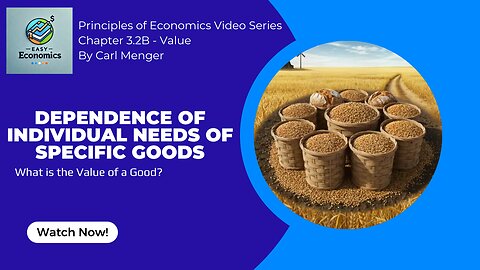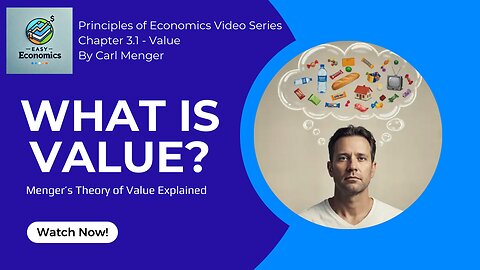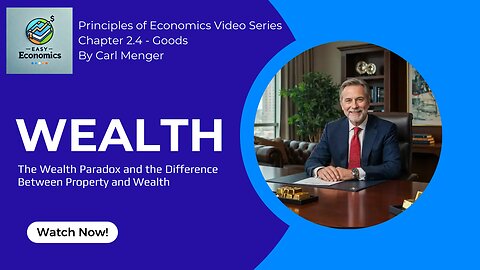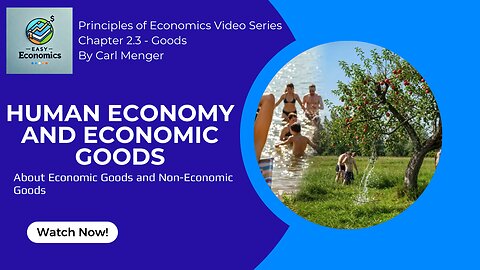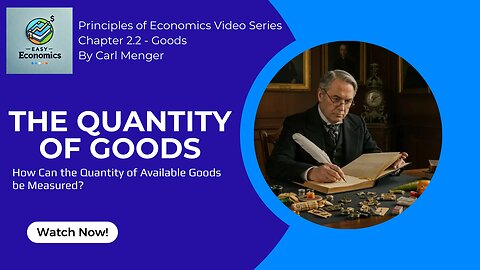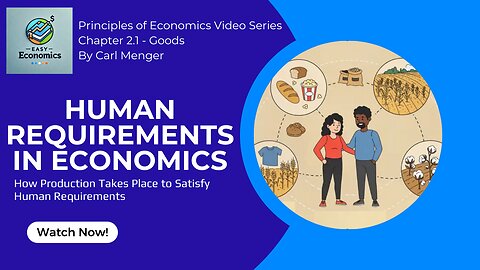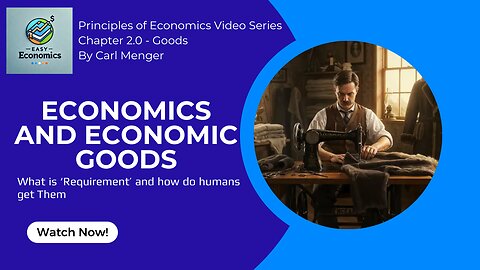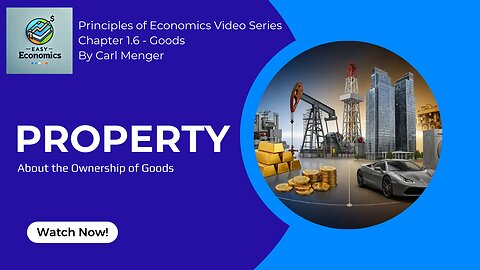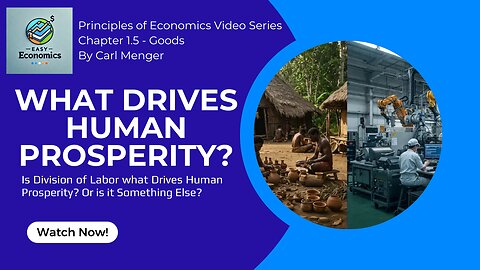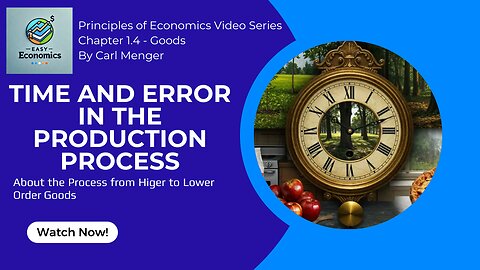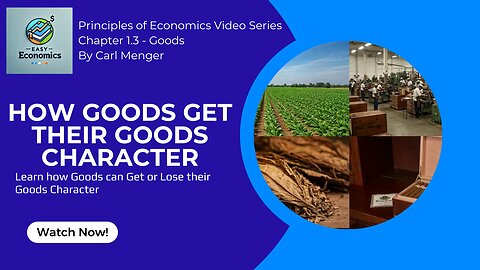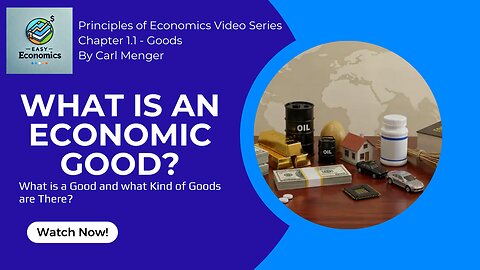Premium Only Content
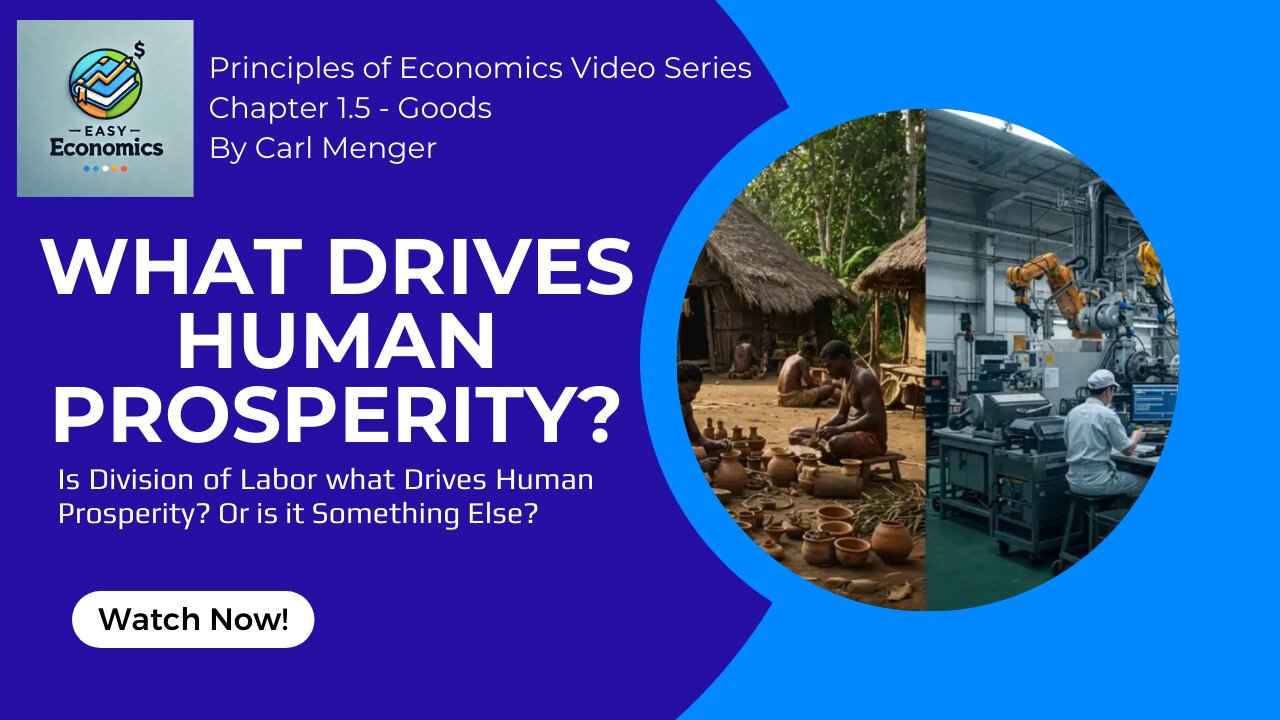
Principles of Economics by Carl Menger Chapter 8.1 - The Nature and Origin of Money
Principles of Economics by Carl Menger Chapter 7.2C - Circulability of Commodities
Principles of Economics by Carl Menger Chapter 7.2B - Differences in Marketability of Commodities
Principles of Economics by Carl Menger Chapter 7.2A - Marketability of Commodities
Principles of Economics by Carl Menger Chapter 7.1 - What is a Commodity?
Principles of Economics by Carl Menger Chapter 5.3C - Competition Policy
Principles of Economics by Carl Menger Chapter 5.3B - Price Formation by Competing Sellers
Principles of Economics by Carl Menger Chapter 5.3A - Price Forming and Distribution by Competition
Principles of Economics by Carl Menger Chapter 5.2D - Principles of Monopoly Trade
Principles of Economics by Carl Menger Chapter 5.2C - Market Dynamics of Monopoly Pricing
Principles of Economics by Carl Menger Chapter 5.2B - Price Forming in Monopoly Trade for Quantities
Principles of Economics by Carl Menger Chapter 5.2A - Price Formation in Monopoly Trade
Principles of Economics by Carl Menger Chapter 5.1 - Price Formation in Isolated Exchange
Principles of Economics by Carl Menger Chapter 5.0 - The Theory of Price
Principles of Economics by Carl Menger Chapter 4.2 - The Limits of Economic Exchange
Principles of Economics by Carl Menger Chapter 4.1 - Foundations of Economic Exchange
Principles of Economics by Carl Menger Chapter 3.3E - The Value of Land, Labour and Capital
Principles of Economics by Carl Menger Chapter 3.3D - The Value of Individual Higher Order Goods
Principles of Economics by Carl Menger Chapter 3.3C - Combined Value of Higher Order Goods
Principles of Economics by Carl Menger Chapter 3.3B - The Productivity of Capital
Principles of Economics by Carl Menger Chapter 3.3A - What Causes the Value of Higher Order Goods?
Principles of Economics by Carl Menger Chapter 3.2D - The Subjective Nature of the Measure of Value
Principles of Economics by Carl Menger Chapter 3.2C - Influence of the Quality of Goods on Value
Principles of Economics by Carl Menger Chapter 3 2B - The Value of Goods for Individual Needs
Principles of Economics by Carl Menger Chapter 3.2A - Difference in Importance for Individual Needs
Principles of Economics by Carl Menger Chapter 3.1 - The Theory of Value
Principles of Economics by Carl Menger Chapter 2.4 - What is Wealth?
Principles of Economics by Carl Menger Chapter 2.3 - Human Economy and Economic Goods
Principles of Economics by Carl Menger Chapter 2.2 - Available Quantities of Goods
Principles of Economics by Carl Menger Chapter 2.1 - Human Requirements in Economics
Principles of Economics by Carl Menger Chapter 2.0 - Economy and Economic Goods
Principles of Economics by Carl Menger Chapter 1.6 - Ownership of Goods
Principles of Economics by Carl Menger Chapter 1.5 - Causes of Human Prosperity
Principles of Economics by Carl Menger Chapter 1.4 -Time and Error in the Production Process
Principles of Economics by Carl Menger Chapter 1.3 - The Laws that Govern Goods Character
Principles of Economics by Carl Menger Chapter 1.2 - The Causal Connection Between Goods
Principles of Economics by Carl Menger Chapter 1.1 - The Nature of Goods
Principles of Economics by Carl Menger Chapter 1.5 - Causes of Human Prosperity
You want to read the book? Get it here: https://amzn.to/4cCPIQs
Watch the next video in this series: https://rumble.com/v6s5ai9-principles-of-economics-by-carl-menger-chapter-1.6-ownership-of-goods.html
Watch the video series from the start: https://rumble.com/playlists/I48mBTB4w2c
Watch our video about Carl Menger: https://rumble.com/v61z0l2-carl-menger-the-father-of-austrian-economics-and-subjective-value.html
Is the division of labor really the main reason societies become wealthy? Or is there a deeper cause behind human prosperity?
In this video, we explore Carl Menger’s critique of Adam Smith and his powerful insight into the true roots of economic progress. While Smith emphasized the division of labor as the driver of productivity, Menger agrees only partly. He argues that while labor division is important, the real engine of prosperity is humanity’s growing ability to understand and control production through the use of higher-order goods.
Menger illustrates this with a clear contrast: a tribe may divide tasks well, but if all they do is gather what nature provides, their wealth remains limited. True prosperity begins when people stop passively collecting and start actively producing—using tools, machines, and knowledge to transform raw inputs into finished goods.
As societies climb the chain of production—from clubs to bows, from hunting to farming, from manual tools to industrial systems—they create new goods, new jobs, and new wealth. Labor division follows this growth, not the other way around.
The key insight: Prosperity is caused by knowledge—by understanding the causes of production and learning to control them. Labor division supports this, but it is not the root.
❓ Questions This Video Answers:
-What did Adam Smith get right—and miss—about prosperity?
-Why is division of labor not enough to explain wealth creation?
-How do higher-order goods increase human control over nature?
-What role does knowledge play in economic development?
-How does production evolve as societies grow?
00:00 - Introduction to Causes of Human Prosperity
00:12 - Adam Smith and the Division of Labor
00:45 - Division of Labor in Indigenous Tribe Example
01:14 - Society Using Higher-Order Goods
01:41 - Progression of Tools and Techniques
02:00 - Abundance of Goods and Labor Division
02:24 - Basic Economies vs. Understanding Cause and Effect
02:51 - Human Will and Natural Law
03:09 - How Civilization and Human Progress happens
03:34 - Outro
#WealthCreation #EconomicProgress #CarlMenger
-
 1:03:23
1:03:23
Tactical Advisor
13 hours agoNew Gun Unboxing | Vault Room Live Stream 044
235K39 -
 19:12
19:12
Robbi On The Record
14 hours ago $19.02 earnedThe Loneliness Epidemic: AN INVESTIGATION
70.4K95 -
 14:45
14:45
Mrgunsngear
1 day ago $113.27 earnedFletcher Rifle Works Texas Flood 30 Caliber 3D Printed Titanium Suppressor Test & Review
121K29 -
 17:17
17:17
Lady Decade
1 day ago $8.18 earnedMortal Kombat Legacy Kollection is Causing Outrage
79.7K14 -
 35:51
35:51
Athlete & Artist Show
1 day ago $14.15 earnedIs Ryan Smith The Best Owner In The NHL?
92.5K12 -
 22:56
22:56
American Thought Leaders
2 days agoCharles Murray: I Thought Religion Was Irrelevant to Me. I Was Wrong.
75.8K39 -
 36:22
36:22
Brad Owen Poker
15 hours agoGIGANTIC $17,000+ Pot In BOBBY’S ROOM! TRAPPING Top Pro w/FULL HOUSE!! Big Win! Poker Vlog Ep 326
80K9 -
 3:53
3:53
GreenMan Studio
1 day agoRUMBLE RUNDOWN: DREAM HACK SPECIAL W/Greenman Reports
64.6K13 -
 1:28
1:28
Damon Imani
2 days agoThey Laughed at Trump’s Cognitive Test — Damon Made Them REGRET It!
61.7K40 -
 9:14
9:14
Freedom Frontline
1 day agoAdam Schiff PANICS As Eric Schmitt Exposes His Dirty Lies LIVE
41.8K83
